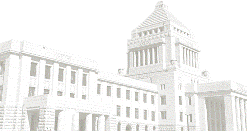
Committees
Committees examine in detail law bills, budgets, treaties,
and petitions. They also investigate other matters that fall
within their jurisdiction. Sometimes committees establish
sub-committees.
In order to open a committee meeting, at least half its
members must be present. Committee meetings are, as a rule,
closed to the public. However, members of the press, radio
and TV, and other media may be admitted to meetings at the
discretion of the chairman.
A committee may demand the presence of the Prime Minister,
other Ministers of State, the Deputy Chief Cabinet Secretary,
Senior Vice-Ministers, Parliamentary Secretaries, Government
special advisers or the President and members of the Audit
Board so that they can explain certain specific matters;
they may, with prior notice given to the chairman, attend
meetings of a committee and speak at them.
At the committee stage, a committee may confer with other
committees and hold joint examination meetings with them.
Such meetings are simply and solely to conduct examinations;
they can render no decisions on bills.
A committee must hold public hearings on the general budget
and important revenue bills and may do so on important bills
of public interest in order to hear the opinions of
interested parties or people of learning and experience. A
committee may, if deemed necessary for an effective
examination or investigation, summon a witness to appear
before it to give evidence.
The committee chairman, as the presiding officer at meetings,
arranges the proceedings of the committee, maintains order,
and represents the committee. Among other matters, the
chairman has the right to call committee meetings,
precipitate a decision by initiating a vote, report to the
house regarding the matters examined by the committee,
explain in the other house the purport of a bill initiated by
the house to which the chairman belongs, and offer opinions
at other committee meetings. A committee may choose several
directors from among its members. If the Chairman becomes
disabled for some reason, one of the directors discharges the
functions of chairman. The chairman and directors must affix
their signatures to the minutes of the committee meetings.
There are two types of committees:
(a) Standing committees
The House of Representatives has 17 standing
committees, each having 20 - 50 members; the House of
Councillors has 17 standing committees, each with
10 - 45 members. Every Diet member should serve on at
least one standing committee. Committee members are
nominated by the speaker or the president of the
house they belong to and hold their membership until
their term of office as members of the Diet expires.
The places on each committee are allocated to
political parties or groups in proportion to their
numerical strength in the house, and the presiding
officer nominates them on the recommendation of
parties or groups. The terms of reference of each
standing committee cover a specific sphere of
government administration, but these are not always
identical with those of any one government ministry
or agency.
Each house ostensibly nominates the chairmen of the
standing committees, but in practice the selection is
entrusted to the speaker or the president. In both
houses, chairmanships are distributed among the
parties in accordance with their numerical strength.
There are Committees on Cabinet; Internal Affairs and Communications; Judicial
Affairs; Foreign Affairs; Financial Affairs; Education,
Culture, Sports, Science and Technology; Health, Labour
and Welfare; Agriculture, Forestry and Fisheries; Economy,
Trade and Industry; Land, Infrastructure, Transport and Tourism;
Environment; Security; Fundamental National Policies;
Budget; Audit and Oversight of Administration; Rules
and Administration; and Discipline in the House of
Representatives. A Committee on Fundamental National
Policies was set up in each House in January 2000 to
provide the Prime Minister and the Leaders of Opposition
Parties with an opportunity to conduct a one-on-one
debate on basic policies of the nation. The system was
introduced on the model of the "Prime Minister's Question
Time" in the U.K. Parliament. The Committees of both
Houses hold a joint meeting once a week in either House
alternately, with 30 Members from the House of
Representatives and 20 from the House of Councillors.
The Budget Committee, which has the largest membership
in each house, examines national revenue and expenditures,
and members representing various political parties and
groups ask questions of the prime minister and all other
ministers of state pertaining to national administration
in general. The Committee on Rules and Administration
has the task of fixing the dates of plenary sittings,
the order of business, speakers and their allocated
time, and discussing general administrative matters of the
house. Its meetings are attended by the Speaker,
Vice-Speaker and the Secretary General of the House.
The Committee on Audit and Oversight of Administration
in the House of Representatives was set up to upgrade and
strengthen the function of oversight of administration in
the House of Representatives. A Professional Adviser or
"Semmon-in" is allocated to each Standing Committee to
assist Committee members, together with researchers as
his/her subordinates, in investigating matters under the
jurisdiction of the Committee.
(b) Special committees
Each house may appoint a special committee in order
to examine those matters that the house decides are
in need of examination or matters that do not come
under the jurisdiction of any standing committee. The
members of a special committee are appointed by the
house so as to reflect the proportional
representation of the political parties or groups in
the house, and members serve until the matters
referred to the special committee have been decided
upon by the house.
The chairman of a special committee should be elected
from among its members, and in practice he or she is
selected by a motion of recommendation by the
committee.

